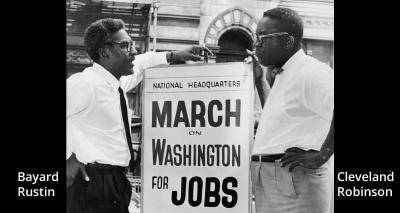Bayard Rustin’s Dedication and Vision Resonate Today

Photo by Orlando Fernandez, World Telegram & Sun / Library of Congress, Prints and Photographs Division, NYWT&S Collection, reproduction number: LC-USZ62-133369
In front of 170 W 130 St., March on Washington, Bayard Rustin, Deputy Director (left) and Cleveland Robinson, Chairman of Administrative Committee (right).
Bayard Rustin worked on the 1963 March on Washington for Jobs and Freedom in the same spirit in which he had contributed his brilliance to the Civil Rights Movement for decades. He put the work itself ahead of getting any personal recognition or credit.
He continues to be a model for all who strive to build a better world. Among other things, Rustin was the March’s top organizer and brought together Civil Rights and union leaders, orchestrated the program, trained the marshals, and coordinated the buses. Yet he remained in the background, and during the year-long preparations for the March, he pushed Martin Luther King and A. Phillip Randolph in front of the cameras.
He thought his visibility might hinder the March’s effectiveness. Although he never hid the fact that he was a gay man, and some 20 years later fought for gay rights, he perceived that his sexual orientation and his having been a member of the Communist Party for a short time in 1936 could make him a prime target of the racists who were trying to undermine the effectiveness of the March and of the Movement itself.
In the same spirit, in 1956 he agreed that his name should not appear on a very influential pamphlet he wrote for the American Friends Service Committee, “Speak Truth to Power: A Quaker Search for an Alternative to Violence.”
I first met Bayard in 1962 at a meeting he had called at a conference center in Dorchester, Georgia, which I attended as an organizer working for SNCC – the Student Nonviolent Coordinating Committee. The purpose of the meeting was to try to iron out differences between SNCC and the Southern Christian Leadership Conference (SCLC), which Bayard had helped Martin Luther King organize. It turned into one of the first planning sessions for what would become the March on Washington.
As random luck would have it, I was assigned to room at the conference center with both Bayard and MLK. I think Bayard sensed my overriding timidity and the fact that I was shell-shocked from having been tossed in jail several times in Southwest Georgia, beaten and shot at. He bolstered my self-confidence and encouraged me to stay in the struggle.
Rustin was one of the first Freedom Riders. In 1942, he boarded a bus in Louisville headed for Nashville. When he refused to move to the back, he was arrested and beaten. Then, in 1947, he helped organize the Journey of Reconciliation, the first group to test the banning by the Supreme Court of racial discrimination in interstate travel.
Before that, he spent two years in prison as a conscientious objector during World War II. While incarcerated, he organized protests against racially segregated housing and dining facilities.
Over the years, in addition to SCLC, he helped organize and/or lead the Fellowship of Reconciliation (FOR), the Congress of Racial Equality (CORE), the War Resisters League, Social Democrats USA, and the A. Phillip Randolph Institute – always as “Brother Outsider,” the name of an award-winning documentary film about his life.
A lifelong Quaker and student of Gandhi, Rustin was an advisor to the young Martin Luther King, Jr. during the Montgomery Bus Boycott and introduced him to the philosophy of nonviolence, which King adopted.
Throughout his long career, he advocated for working class people of all races to collaborate for common economic goals. His philosophy was based on a combination of Quakerism and Socialism.
In his later years, he seemed to veer away from his non-violent principles, but he never stopped fighting for universal healthcare, full employment, and an end to economic inequity.
At the March on Washington, he was never introduced or recognized from the platform set up on the Lincoln Memorial, but he was up there, directing the speakers and ensuring the program flowed with few hitches.
Although he never introduced himself, he called the March to order with words that resonate today. He told the crowd of more than a quarter of a million people he had gathered that day that the March was for Jobs and Freedom, emphasizing that racial equality is impossible to achieve without economic equity.
In 2013, President Barack Obama posthumously awarded Rustin the Presidential Medal of Freedom, the highest civilian award in the United States. The Presidential statement to the press read:
“Bayard Rustin was an unyielding activist for civil rights, dignity, and equality for all... and fought tirelessly for marginalized communities at home and abroad. An openly gay African American, Mr. Rustin stood at the intersection of several of the fights for equal rights.”
